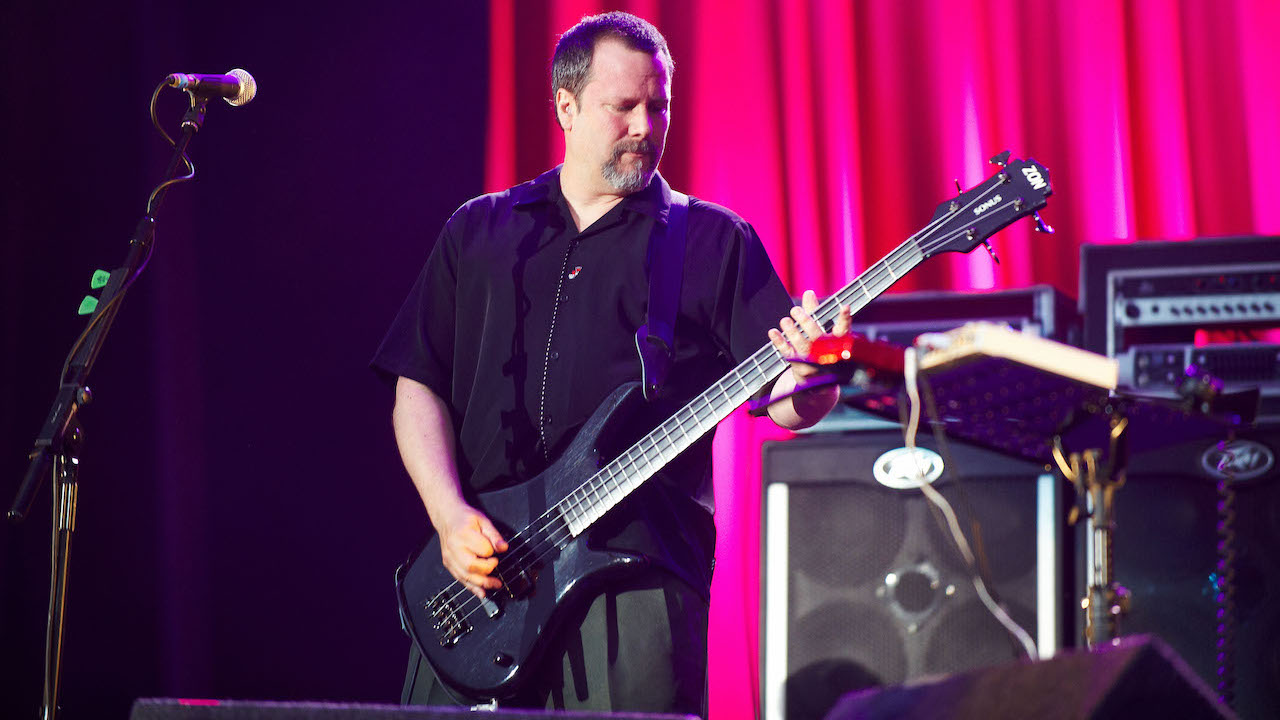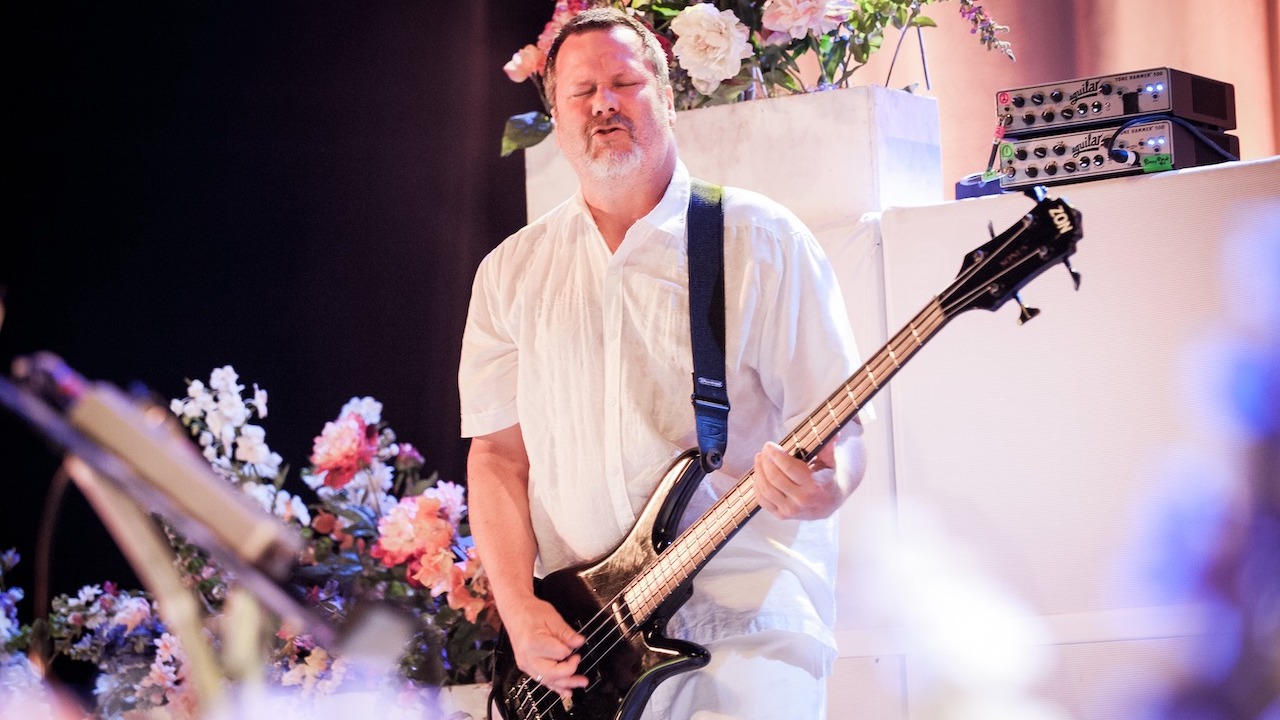“Slap bass has that metallic sound, like a hammer. If you played bass with a pick it wouldn’t sound the same. Actually, I did that on Epic”: How Billy Gould crafted his driving bass tone on Faith No More’s biggest hits
Billy Gould’s funk bass leanings powered We Care A Lot and Epic by San Francisco rockers Faith No More

All the latest guitar news, interviews, lessons, reviews, deals and more, direct to your inbox!
You are now subscribed
Your newsletter sign-up was successful
Back in the 1980s, you had your fingerstyle bassists, your pick players and your slappers. Rarely did the three styles meet, unless your name happened to be Billy Gould, founder member and bassist with the truly uncategorizable Faith No More.
Driving his tone to unheard-of heights and attacking his bass guitar with fingers, thumb and pick, Gould was a lesson to all of us that it didn't matter how you played as long as you played like you meant it.
Asked about his early musical education, Gould told Bass Player: “I got into punk rock pretty young: I was probably 15 or 16, so by the time I was 18 l was over it. l'd already moved on. The IQ seemed to go down and post-punk was a little more intellectual and was more interesting in terms of the playing. I was inclined towards darker stuff – Siouxsie & The Banshees, A Certain Ratio, Bauhaus – a lot. Japan not as much, although other guys in my band did.
“I never liked fusion, really, apart from a very brief period before I got into punk when I liked King Crimson, John Wetton, Chris Squire of course. Gentle Giant, maybe. But after that it was all about the Stranglers and Motörhead – bassists with aggressive tones. Later, Joy Division were totally an influence.”
So where did the funk elements of Gould's sound come from? “When I was in high school I worked for a pharmacy, and I used to do a lot of deliveries for them. I spent a lot of time driving around South Central, LA, dropping off supplies, and when l'd get out of my car, people would be blasting Parliament-Funkadelic. I didn't even like it that much back then, but it became part of who I am because l was so exposed to it. It wasn't really that cool at the time!”
An early expression of Gould's funk leanings came with Faith No More's 1987 single We Care A Lot, which featured a slapped bassline, although ‘repeated popped fill’ would probably be a better way to describe it.
“I don't slap that much, but because of the way we were writing at the time, and because our drummer Mike Bordin is a very deliberate hitter, it was about making the most of what I had to work with.
All the latest guitar news, interviews, lessons, reviews, deals and more, direct to your inbox!
“I wanted to make maximum impact and push the speakers. Slap has that metallic sound, like a hammer, and if you did it with a pick it wouldn't sound the same. Actually, I do that with a pick on Epic, which is a very similar bassline to We Care A Lot, but it's a different feel.”
By 1990 and The Real Thing, Gould had evolved his bass playing a step: listen to the odd, syncopated feel of Woodpecker From Mars for an example.
“That whole song is fingers. It’s a very African-sounding bass rhythm. What happened was, when we were in school, Bordin went to take some drum classes from an African guy and he totally changed the way he looked at music. He would come back and show me stuff like playing on and off with him. I went to those classes too, and learned a language which was away from 4/4 playing.”
In a sense, the funk-metal/funk-rock tag didn't do Faith No More justice, even in their early career, because the group had so many more strings to their bow. “I can't do what Flea or Les Claypool can do. Louis Johnson would kick the crap out of me! But that's not what l was looking for. I see making music as street fighting. It's like kickboxing, it's not like painting a picture. I'm not interested in that.”
As you'll know, Gould has an unusual bass style, composed mostly of beating his instrument into submission while leavening the violence with some pretty exquisite fills and rests. This means that his signature Zon needs to be built to take the punishment.
“It's taken a lot of abuse, and there's a tiny bit of rust, but that's it. It'll last me my lifetime, that's for sure. I haven't had lots of things done to it: it's just built really well. There's only one knob on it, so the tone is actually in the pickups.”
The Brazilian rosewood-bodied BG4 is accompanied by a BG5, although Gould himself isn't a fan of five-strings (“I don't like them, because I can't dig in there and be physical”) and indeed any string configuration more than the usual four (“I can never see myself doing that unless it would be for a special tone on a record or something”). Its graphite neck ties in with his priorities – simplicity and reliability – because he knows it will play the same every night.”

“The great thing about the graphite necks is that you can fly, take them on a plane and the bridge will be exactly like it was at the last gig. I had Aria Pro IIs before these, which were cool. Cliff Burton introduced me to those and I loved them [Burton was in a high school band with classic-era Faith No More guitarist Jim Martin – Ed], but if it was a sweaty night, the neck would be totally fucked. If it was cold, it would be totally different. So I was never happy!”
Any advice for our readers, we asked? Gould paused before replying, “My advice is to start a band with somebody and play live. Even if you suck, keep playing gigs, because you can't waver when you're playing on stage: you're forced to stand up straight and play.”
Joel McIver was the Editor of Bass Player magazine from 2018 to 2022, having spent six years before that editing Bass Guitar magazine. A journalist with 25 years' experience in the music field, he's also the author of 35 books, a couple of bestsellers among them. He regularly appears on podcasts, radio and TV.

![Faith No More - We Care a Lot (Official Music Video) [4K] - YouTube](https://img.youtube.com/vi/LQhX8PbNUWI/maxresdefault.jpg)


